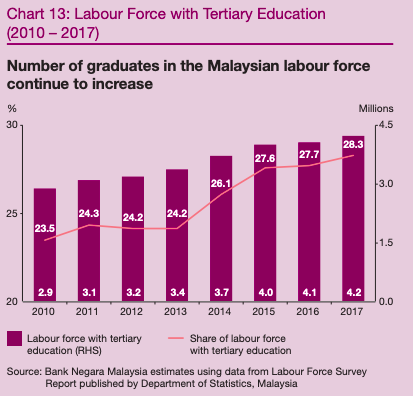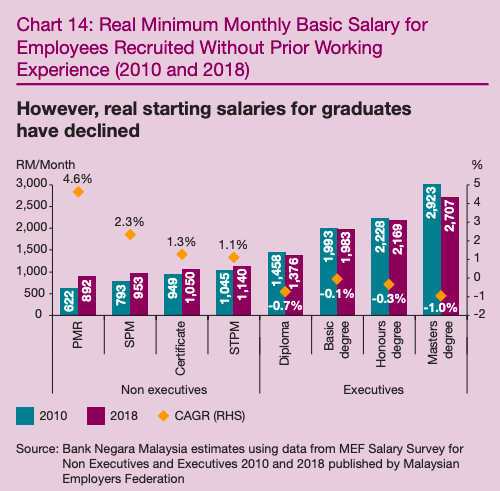Malaysian Fresh Graduates Are Being Paid Less Than They Were 9 Years Ago
Bank Negara Malaysia found that real salaries for fresh graduates declined since 2010.
In its annual report published yesterday, 27 March, Bank Negara Malaysia (BNM) found that monthly salaries for fresh graduates have declined since 2010
The report revealed that although the number of graduates in Malaysian labour force increased significantly from 2010 to 2017, their starting salaries remain underwhelming.
According to BNM, the number of diploma and degree holders in the labour force increased by an average of 173,457 persons every year since 2010. However, only 98,514 people were employed in high-skilled jobs every year.
"This suggests that the economy has not created sufficient high-skilled jobs," the report read.
BNM also cited a study by Khazanah Research Institute, which found that 95% of young employees in unskilled jobs and 50% of those in low-skilled manual jobs are over-qualified for their job scopes.
Moreover, the starting salaries for fresh graduates have decreased since 2010
A diploma holder, who would have earned RM1,458 per month in 2010, only received RM1,376 in 2018. Meanwhile, a Masters degree holder only earned RM2,707 monthly in 2018, in comparison to RM2,923 in 2010.
BNM also attributed this pattern to the lack of jobs created for employees with high level of education.
"Despite obtaining a high level of education, employees had to settle for jobs that typically do not require such education levels," the report read.
"With an ample supply of graduates and limited demand for them by firms, graduate salaries have faced downward pressures," BNM added.
Meanwhile, starting salaries for those without a tertiary education have increased in comparison to 2010
Real salaries for employees who hold PMR or SPM certificates in 2018 increased by 4.6% and 2.3% respectively compared to 2010 wages.
BNM said that this phenomenon was caused by the implementation of minimum wage in the country which pushed up the salaries of lower-skilled workers.
"If left unaddressed, this could reduce the incentive for the younger population to pursue higher levels of education and potentially exacerbate the 'brain drain' issue in Malaysia," the report said.


